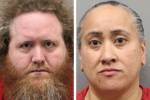Flu bug hasn’t bitten many in Southern Nevada so far
First, the good news: Surveillance shows that influenza activity remains low in Southern Nevada and throughout the state.
Now the bad news: In nearby California, where many regular visitors to Las Vegas reside, the flu-related death of an adult male in his late 30s was reported on Thursday.
The fatality, said Stephanie Bethel, a spokeswoman for the Southern Nevada Health District, is a somber reminder that the peak of flu season -- January through March -- will soon be upon us and that the disease can be deadly as well as a serious nose-wiping and stomach-turning nuisance.
As many as 35,000 die each year from the flu, according to the Centers for Disease Control and Prevention.
"There's no doubt that flu viruses are circulating and that they're pretty infectious," Bethel said. "It's time for many more people to get a flu shot."
There is no problem in Las Vegas finding the flu vaccine at prices that range from a little more than $20 to more than $40 for the inhaled vaccine. The new high-dose shot for people 65 and older is around $50. The health district has administered more than 10,500 doses since mid-September. Private physicians and retail pharmacies also have the vaccine on hand.
The flu shot covers three flu strains: H1N1 or swine flu, H3N2 and Influenza B.
Though top officials with the CDC stress that they want everyone older than 6 months of age to get a flu shot, there will be only enough vaccine available for about half of the nation's more than 310 million people.
But that won't be a problem because not even half the population gets vaccinated.
"In Las Vegas way too many people believe that if they get a flu shot, they're more likely to get the flu," said Dr. Ivan Goldsmith, an internist.
"It's just crazy. There is a lot of mistrust about the medical profession, even the medical literature. They've got a story about grandma getting sick after a flu shot 30 years ago, and it just seems to perpetuate itself."
Goldsmith said he ends up with vaccine that he has to throw away every year.
"We've probably vaccinated around 60 so far and can do another couple hundred," he said, adding that the recession could be stopping some people from spending money on preventative care.
Like many public health officials, Goldsmith said the memory of what happened with swine flu shots in the 1970s carries over through families of today.
"The story gets passed on through generations and seems to get worse," he said. "It's irrational, and we have people getting sick, or dying needlessly."
It was in 1976, after a Fort Dix, N.J., soldier died and more than 200 other recruits were infected with a flu, that a public health system foul-up occurred that still causes fears of vaccinations today.
Scientists then feared that the flu that hit the soldiers could be as lethal as the influenza pandemic of 1918, which killed 500,000 Americans and more than
50 million people worldwide.
So the CDC began a mass inoculation effort. But it went terribly wrong, with 25 people killed by the vaccine and hundreds of others permanently paralyzed.
Only one person died from the 1976 flu, which was distant cousin of the 1918 virus.
CDC officials have said such problems were corrected long ago, pointing out that there were no hitches with the H1N1 vaccine that was rushed into production in 2009 to combat another flu strain that was loosely related to the 1918 virus.
For years, people have noted that health care workers didn't practice what they preached about flu shots. In 2009, the American Academy of Pediatrics reported that just 40 percent of medical professionals got vaccinated. This year, CDC data show that 63 percent of health care workers were immunized by mid-November, up from 56 percent at this time in 2010.
"Maybe sanity is finally going to take root when it comes to vaccinations," Goldsmith said.
Contact reporter Paul Harasim at pharasim@review journal.com or 702-387-2908.























